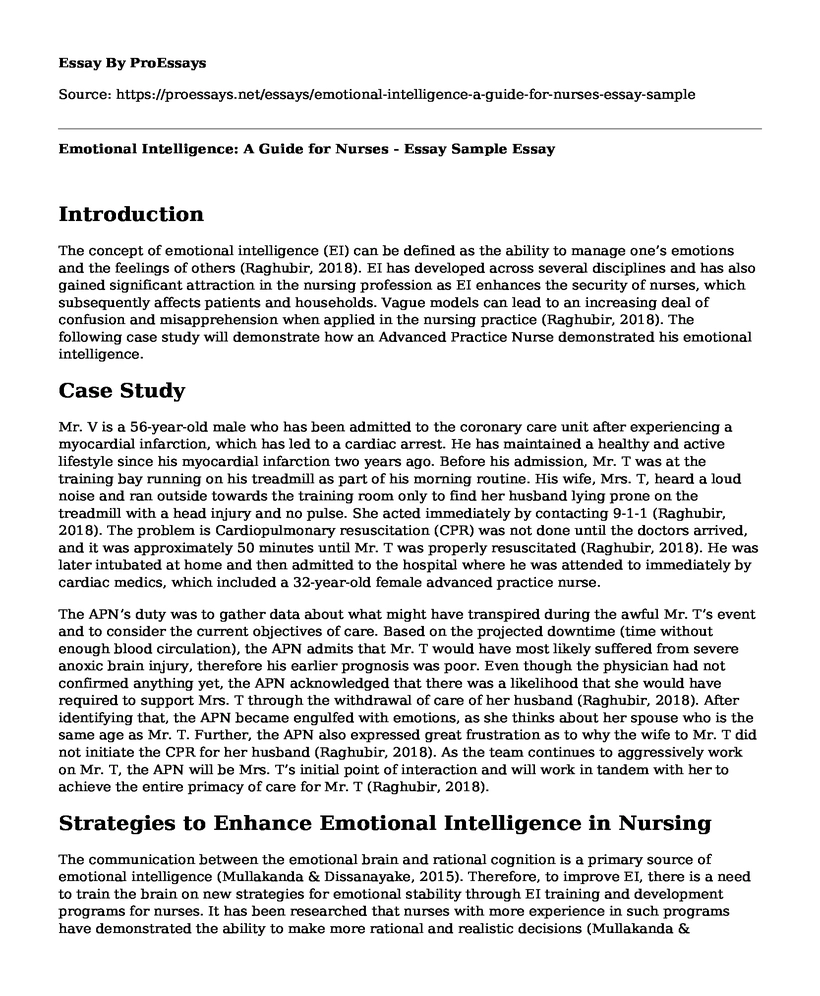Introduction
The concept of emotional intelligence (EI) can be defined as the ability to manage one’s emotions and the feelings of others (Raghubir, 2018). EI has developed across several disciplines and has also gained significant attraction in the nursing profession as EI enhances the security of nurses, which subsequently affects patients and households. Vague models can lead to an increasing deal of confusion and misapprehension when applied in the nursing practice (Raghubir, 2018). The following case study will demonstrate how an Advanced Practice Nurse demonstrated his emotional intelligence.
Case Study
Mr. V is a 56-year-old male who has been admitted to the coronary care unit after experiencing a myocardial infarction, which has led to a cardiac arrest. He has maintained a healthy and active lifestyle since his myocardial infarction two years ago. Before his admission, Mr. T was at the training bay running on his treadmill as part of his morning routine. His wife, Mrs. T, heard a loud noise and ran outside towards the training room only to find her husband lying prone on the treadmill with a head injury and no pulse. She acted immediately by contacting 9-1-1 (Raghubir, 2018). The problem is Cardiopulmonary resuscitation (CPR) was not done until the doctors arrived, and it was approximately 50 minutes until Mr. T was properly resuscitated (Raghubir, 2018). He was later intubated at home and then admitted to the hospital where he was attended to immediately by cardiac medics, which included a 32-year-old female advanced practice nurse.
The APN’s duty was to gather data about what might have transpired during the awful Mr. T’s event and to consider the current objectives of care. Based on the projected downtime (time without enough blood circulation), the APN admits that Mr. T would have most likely suffered from severe anoxic brain injury, therefore his earlier prognosis was poor. Even though the physician had not confirmed anything yet, the APN acknowledged that there was a likelihood that she would have required to support Mrs. T through the withdrawal of care of her husband (Raghubir, 2018). After identifying that, the APN became engulfed with emotions, as she thinks about her spouse who is the same age as Mr. T. Further, the APN also expressed great frustration as to why the wife to Mr. T did not initiate the CPR for her husband (Raghubir, 2018). As the team continues to aggressively work on Mr. T, the APN will be Mrs. T’s initial point of interaction and will work in tandem with her to achieve the entire primacy of care for Mr. T (Raghubir, 2018).
Strategies to Enhance Emotional Intelligence in Nursing
The communication between the emotional brain and rational cognition is a primary source of emotional intelligence (Mullakanda & Dissanayake, 2015). Therefore, to improve EI, there is a need to train the brain on new strategies for emotional stability through EI training and development programs for nurses. It has been researched that nurses with more experience in such programs have demonstrated the ability to make more rational and realistic decisions (Mullakanda & Dissanayake, 2015). Many EI concepts have been used to help nurses manage their emotions and other people’s feelings. Emotional intelligence view 360 was initiated to measure a view of emotional and social efficacy by analyzing key competencies with the job-related performance of nurses. These emotional capabilities will help a nurse effectively respond to the situations they will face in the nursing profession. The significance of emotions is to provide pragmatic information that can alter attention and thoughts, change the physical feelings, and influence what people think about their profession (Bakr & Safaan, 2012). Another way of enhancing emotional intelligence is through positive conflict resolution between nurses, setting up counseling centers for nurses to seek help on personal problems that might be affecting their productivity in the hospital (Bakr & Safaan, 2012).
References
Bakr, M. M., & Safaan, S. M. (2012). Emotional intelligence: a key for nurses' performance. Journal of American Science, 8(11), 385-393. http://www.jofamericanscience.org/journals/am-sci/am0811/059_12042am0811_385_393.pdf
Mullakanda, P., & Dissanayake, K. (2015). Strategies for maintaining emotional stability: The case of nurses in private health care industry. Management Science Letters, 5(12), 1097-1110. file:///C:/Users/User/Downloads/Strategies_for_maintaining_emotional_stability_The.pdf
Raghubir, A. E. (2018). Emotional intelligence in professional nursing practice: A concept review using Rodgers's evolutionary analysis approach. International journal of nursing sciences, 5(2), 126-130. https://www.sciencedirect.com/science/article/pii/S2352013217303812
Cite this page
Emotional Intelligence: A Guide for Nurses - Essay Sample. (2023, Aug 12). Retrieved from https://proessays.net/essays/emotional-intelligence-a-guide-for-nurses-essay-sample
If you are the original author of this essay and no longer wish to have it published on the ProEssays website, please click below to request its removal:
- How Does the Traditional or Cultural Belief Influence the Prevalence of Mental Health in Individuals
- Overview Nursing Ethical Practice Paper Example
- Paper Example on My Journey to Become a Nurse: To Serve Society and Make a Healthy Nation
- Research Paper on UK Welfare State: Quality Healthcare, Social Security & Education
- Essay Example on When Life Support Becomes a Fate Worse Than Death
- Women at the Frontline: Coronavirus Pandemic Response - Essay Sample
- Myocardial Infarction: A Case Study on a 64-Year-Old Patient with Mechanical Complications







